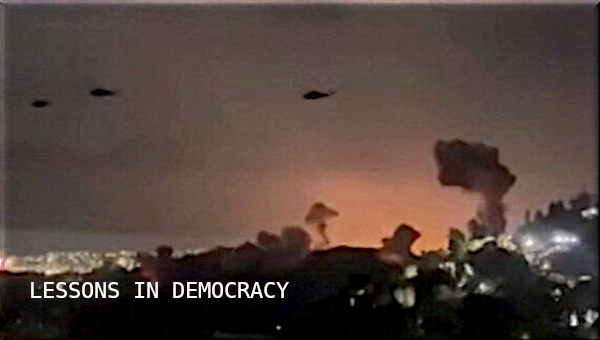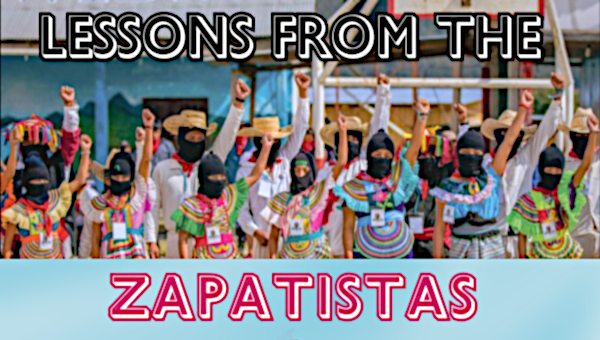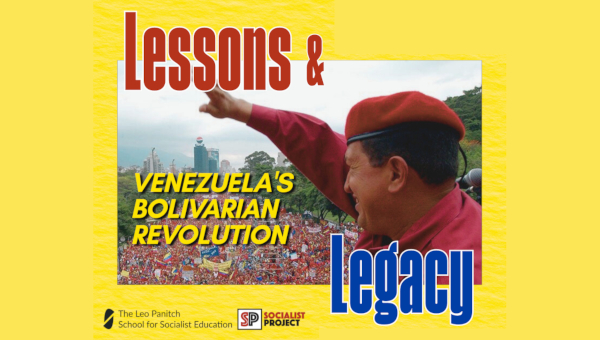Andean Struggles
The revolts against neoliberalism and American imperialism in Latin America continue to unfold in dramatic and unexpected ways. The election on September 30, 2007 for a constituent assembly in Ecuador has been decisively won by President Rafael Correa of the Alianza Pais. This will pave the way for the constitutional foundations for a ‘solidarity economy’ against the neoliberal policies that have wreaked havoc over Ecuador, and particularly its indigenous populations. The proposals extend over a wide range of institutional and political reforms for key resource sectors and banking. Major battles are also expected over nationalizations. An initial encounter will likely be with American oil companies operating in Ecuador (and also associated Canadian holdings and companies). Correa has stated that the intent is to take power away from traditional elites and ‘pave the way for socialism’.
Like Hugo Chavez in Venezuela, Correa has called for a ‘new socialism of the 21st century’. The developments in Ecuador will add to the conflicts intensifying in Bolivia, and the varied attempts by both internal and
international forces to disrupt the government of President Evo Morales. Imperialist forces are also increasing their efforts to isolate Chavez inside Latin America and internationally. But the Iraq war and resistance across the Middle East, and the accumulating economic power in China and to a lesser extent in Russia, are making the international correlation of geopolitical forces more complex, although hardly yet favourable to anti-imperialist forces.
The arc of class struggle extending across the Andes is both growing and intensifying. Some of this is simply these Latin America states asserting independent political trajectories from American imperialism. And some of it is simply rejecting the most egregious aspects of neoliberalism. But the trajectories of these struggles is moving into new terrain as all three political leaderships confront new political obstacles from their still powerful national ruling classes and imperialist forces beginning to deploy new strategies and tactics of isolation and disruption. But social movements, indigenous peoples and working classes are also increasing their self-organization and radicalizing in the process. There has been a movement from anti-neoliberal political struggles and alliances toward anti-capitalist and socialist politics. In developing these new political and organizational capacities, the political conflict over state and political power will inevitably take further unanticipated turns. It is one of the foremost responsibilities of the left in North America to give these movements the political space to live and determine their own course by strengthening anti-imperialist politics across North America. Such struggles will challenge the retreat of movements and many activists, particularly in Canada, into the narrow – and often sectarian – confines of struggling just to survive in union politics or progressive spaces in the academy. One of the promises of 21st century socialism is the renewal of the left beyond Latin America.
Relay here presents a report on the results of the important vote in Ecuador, and the eloquent, direct address of President Morales to the United Nations for an alternate vision of ecology, development and indigenous rights.
Left Triumphs in Ecuadoran Elections, Country’s Institutions to be Transformed
“We have won an historic victory,” proclaimed President Rafael Correa of Ecuador. On Sunday the political coalition he heads won an overwhelming majority of the seats in the Constituent Assembly that is tasked with “refounding” the nation’s institutions. Taking office early this year in a land slide victory, Correa has repeatedly called for an opening to a “new socialism of the twenty- first century,” declaring that Ecuador has to end “the perverse system that has destroyed our democracy, our economy and our society.” His government marks the emergence of a radical anti-neoliberal axis in South America, comprising Venezuela, Bolivia and now Ecuador.
“The Assembly elections are a devastating blow for the oligarchs and the right wing political parties who have historically pulled the strings on a corrupt state that includes Congress and the Supreme Court,” says Alejandro Moreano, a sociologist and political analyst at the Andean University Simon Bolivar in Quito. Even Michel Camdesseus, the former director of the International Monetary Fund, once commented that Ecuador is characterized “by an incestuous relation between bankers, political-financial pressure groups and corrupt government officials.”
The victory in the Constituent Assembly is the result of years of agitation and struggle by Ecuador’s indigenous and social movements along with an unorganized, largely middle-class movement of people known as the “forajidos,” an Ecuadoran term meaning outlaws or bandits who rebel against the established system. In March when the Congress and the right wing political parties tried to sabotage the elections for the Assembly, tens of thousands of demonstrators took to the streets of Quito, blocking the entrances to Congress and backing the disbarment of the Congressional members who wanted to suppress the elections.
The “Country Movement,” the popular political coalition lead by Correa, will convene the Assembly at the end of October. Its charge is to draft a new constitution that will break up the dysfunctional state, establish a plurinational, participatory democracy, reclaim Ecuadoran sovereignty, and use the state to create social and economic institutions that benefit the people. One of its first acts will be to abolish the existent Congress.
The Assembly will also facilitate an international realignment of Ecuador’s international relations. The Correa government has already moved assertively in its relations with the United States. María Fernanda Espinosa, the dynamic Minister of Foreign Relations, declared that Ecuador intends to close the U.S. military base located at Manta, the largest of its kind on South America’s Pacific coast. “Ecuador is a sovereign nation,” she said. “We do not need any foreign troops in our country.” The treaty for the base expires in 2009 and will not be renewed.
Thus far there have been no direct confrontations with the United States, but the Pentagon has manifested its displeasure. Every year since 1959, the U.S. Southern Command, together with the Pacific coast nations of South America, have undertaken joint naval exercises called Unitas. This year they were to be hosted in Ecuador, but the United States opted to conduct them in Colombia, its closest regional ally. Ecuador responded by announcing it would not participate in this year’s exercises, with Correa proclaiming, “It appears the Southern Command believes we are a colony of the United States, that our navy is just one more unit controlled by their country.”
Correa is also standing up to Occidental Petroleum, a U.S.-based corporation whose Ecuadoran holdings were taken over by state-owned PetroEcuador last year for selling off some of its assets to a Canadian company in violation of its contract with the Ecuadoran state. With the takeover of Occidental’s holdings, PetroEcuador now controls more than half of the country’s petroleum exports, which themselves account for about 40% of Ecuador’s total exports and one third of government revenues. Correa has denounced Occidental’s “lobbying” of the Bush administration to regain its holdings. “We are not going to allow an arrogant, portentous transnational that doesn’t respect Ecuadoran laws to harm our country,” he said.
At the same time, Ecuador is negotiating special bilateral trade and economic agreements with presidents Chávez and Morales. Venezuela has agreed to refine Ecuadoran oil and help fund social programs in Ecuador, while the Bolivian government has concluded an agreement to import foodstuffs from small- and medium-size producers in Ecuador. Correa has also signed several petroleum accords with Venezuela, of which the most important is a $4 billion project for a refinery backed by PetroEcuador and the Venezuelan state petroleum company.
Alejandro Moreano of the Andean University worries that “that all of the interests involved in the Country Movement may not back the tough steps needed to end neo-liberalism and bring the banks and multinationals under control. This will depend on the strength of popular mobilizations as the Assembly undertakes its work.” For his part Correa has repeatedly denounced the private banks in Ecuador for their exorbitant profit-taking and high interest rates. And he has expelled Ecuador’s World Bank representative for meddling in the country’s affairs and has virtually terminated the country’s relations with the International Monetary Fund.
There is already a steady drum beat by the indigenous and popular movements to have the Constituent Assembly take over all multinational mining interests. In early June, the local populace in the gold-mining southern highland province of Azuay, backed by environmental and human rights organizations, blockaded major highways, demanding the expropriation of the mining companies, many of which are controlled by transnational corporations that have polluted local rivers and aquifers.
Alberto Acosta, an internationally renowned anti-neoliberal economist who will be president of the Constituent Assembly, met with the protesters. He told them the mining concessions couldn’t be annulled outright. “This is a task of the Constituent Assembly,” he said. “It can establish a legal framework that will enable us to revise all the concessions.” This month on October 22 a national mobilization will take place that will call upon the Assembly to nationalize all foreign mining interests in the country. •
“Let’s respect our Mother Earth”
Address from President Evo Morales to the member representatives of the United Nations on the issue
of the environment – September 24, 2007.
Sister and brother Presidents and Heads of States of the United Nations: The world is suffering from a fever due to climate change, and the disease is the capitalist development model. Whilst over 10,000 years the variation in carbon dioxide (CO2) levels on the planet was approximately 10%, during the last 200 years of industrial development, carbon emissions have increased by 30%. Since 1860, Europe and North America have contributed 70% of the emissions of CO2. 2005 was the hottest year in the last one thousand years on this planet.
Different investigations have demonstrated that out of the 40,170 living species that have been studied, 16,119 are in danger of extinction. One out of eight birds could disappear forever. One out of four mammals is under threat. One out of every three reptiles could cease to exist. Eight out of ten crustaceans and three out of four insects are at risk of extinction. We are living through the sixth crisis of the extinction of living species in the history of the planet and, on this occasion, the rate of extinction is 100 times more accelerated than in geological times.
Faced with this bleak future, transnational interests are proposing to continue as before, and paint the machine green, which is to say, continue with growth and irrational consumerism and inequality, generating more and more profits, without realising that we are currently consuming in one year what the planet produces in one year and three months. Faced with this reality, the solution can not be an environmental make over.
I read in the World Bank report that in order to mitigate the impacts of climate change we need to end subsidies on hydrocarbons, put a price on water and promote private investment in the clean energy sector. Once again they want to apply market recipes and privatisation in order to carry out business as usual, and with it, the same illnesses that these policies produce. The same occurs in the case of biofuels, given that to produce one litre of ethanol you require 12 litres of water. In the same way, to process one ton of agrifuels you need, on average, one hectare of land.
Faced with this situation, we – the indigenous peoples and humble and honest inhabitants of this planet – believe that the time has come to put a stop to this, in order to rediscover our roots, with respect for Mother Earth; with the Pachamama as we call it in the Andes. Today, the indigenous peoples of Latin America and the world have been called upon by history to convert ourselves into the vanguard of the struggle to defend nature and life.
I am convinced that the United Nations Declaration on the Rights of Indigenous Peoples, recently approved after so many years of struggle, needs to pass from paper to reality so that our knowledge and our participation can help to construct a new future of hope for all. Who else but the indigenous people, can point out the path for humanity in order to preserve nature, natural resources and the territories that we have inhabited from ancient times.
We need a profound change of direction, at the world wide level, so as to stop being the condemned of the earth. The countries of the north need to reduce their carbon emissions by between 60% and 80% if we want to avoid a temperature rise of more than 2º in what is left of this century, which would provoke global warming of catastrophic proportions for life and nature.
We need to create a World Environment Organisation which is binding, and which can discipline the World Trade Organisation, which is propelling as towards barbarism. We can no longer continue to talk of growth in Gross National Product without taking into consideration the destruction and wastage of natural resources. We need to adopt an indicator that allows us to consider, in a combined way, the Human Development Index and the Ecological Footprint in order to measure our environmental situation.
We need to apply harsh taxes on the super concentration of wealth, and adopt effective mechanisms for its equitable redistribution. It is not possible that three families can have an income superior to the combined GDP of the 48 poorest countries. We can not talk of equity and social justice whilst this situation continues.
The United States and Europe consume, on average, 8.4 times more that the world average. It is necessary for them to reduce their level of consumption and recognise that all of us are guests on this same land; of the same Pachamama.
I know that change is not easy when an extremely powerful sector has to renounce their extraordinary profits for the planet to survive. In my own country I suffer, with my head held high, this permanent sabotage because we are ending privileges so that everyone can “Live Well” and not better than our counterparts. I know that change in the world is much more difficult than in my country, but I have absolute confidence in human beings, in their capacity to reason, to learn from mistakes, to recuperate their roots, and to change in order to forge a just, diverse, inclusive, equilibrated world in harmony with nature. •
Evo Morales Ayma
President of the Republic de Bolivia
September 24, 2007
Originally published on the boliviarising.blogspot.com blog.





